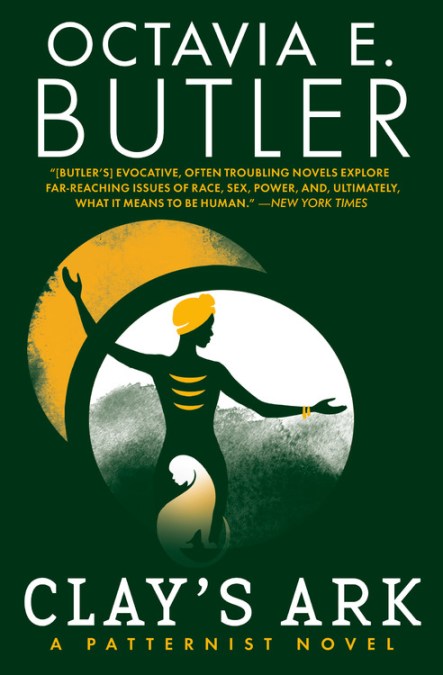|
|
Clay’s Ark, by Octavia Butler Published by Hatchette Book Group. |
Heard of Octavia Butler? If not, you should. She was a Hugo and Nebula award winner for breaking the gender and racial barriers in storytelling in science fiction. And Clay’s Ark is no exception to her catalog, with its strong black female characters, from the infected to the victims (yes, strong victims who fight back!).
Butler’s story, first published in 1980 and set in 2021, is a page-turner. It’s Mad Max meets Andromeda Strain with a dose of batsh!t crazy polygamous rape and offscreen attempted Elektra Complex to boot, set in the California desert and told in two parts. And the dual narrative paints far more complex characters than a single narrative would.
The protagonist in the very first scene, a black astronaut named Eli, crash-lands in the desert and tries to hide for as long as possible before seeking help. (He knows he was infected on the ship.) But the alien microbial intelligence within him won’t let him off so easily. He’s disoriented and has somehow survived the infection. Now he also has heightened senses, agility, speed and strength.
Controlled by the microbes, Eli walks a thin line between surviving and spreading the alien consciousness, as he infects a family of desert farmers in the wild lands of California. He infects Meda first, who has taken a liking to him, but is no pushover. The family manages to survive through farming and very limited shopping trips into town for supplies. They also keep the microbes at bay from world invasion by, once in a while, kidnapping new members for their commune. The alien microbe seems to keep their animal senses heightened, as well as their libidos. Then the newborn children arrive, Meda and Eli’s child Jacob first, and they’re human — mostly.
Despite the horrible-acting adults in the room, the microbes seem to keep everyone placated and loyal to their kind, sort of like cats recognizing each other as a pride by their shared scents. So, regardless of how unnervingly alien the kids are, they are still endearing, because they tend to be the most decent-acting in the story.
In the second plot line, told in alternating chapters, the protagonist flips to become the antagonist when Eli kidnaps Blake, a white widower doctor, and his two black daughters Keira and Rane, on the road home to their walled city from the struggling community medical facility where Blake works. Rane has leukemia, and is on life-saving drugs. But once all three are infected with the alien microbes, there’s no return to home. Things spin into gear when Blake decides to escape, with the full knowledge that Eli and his family will hunt him down rather than see the world infected.
I won’t give away the rest, except that the story-telling is break-neck. The characters are fully realized, each human throughout, even while infected by the alien microbes, which in effect intensify their humanity through crisis and draw it into focus through comparison with the microbes’ alienness and mystery. This is perhaps not the best of books to read during a pandemic, as it can elicit paranoia and fear of microbes. But its theme also helps orient the reader in the reality of a pandemic through the same kind of comparison to its own alienness.
The predictions from 40 years ago are not that far off from reality. We now have on the market such tank-like SUVs that homesteaders actually own. The space station is in orbit, and the divisions in society of country folk versus city folk has certainly become noticeable in politics worldwide (as it has been to a lesser degree since the onset of the Industrial Revolution, but I digress…). Butler’s work stands as solid 40 years on as when it was published, and certainly ranks her as a top futurist, in addition to her being a Nebula, Hugo and Locus award-winning author. Pick up a copy, but read with caution. It’s for the strong-constitutioned zombie-loving sci-fi fan.

